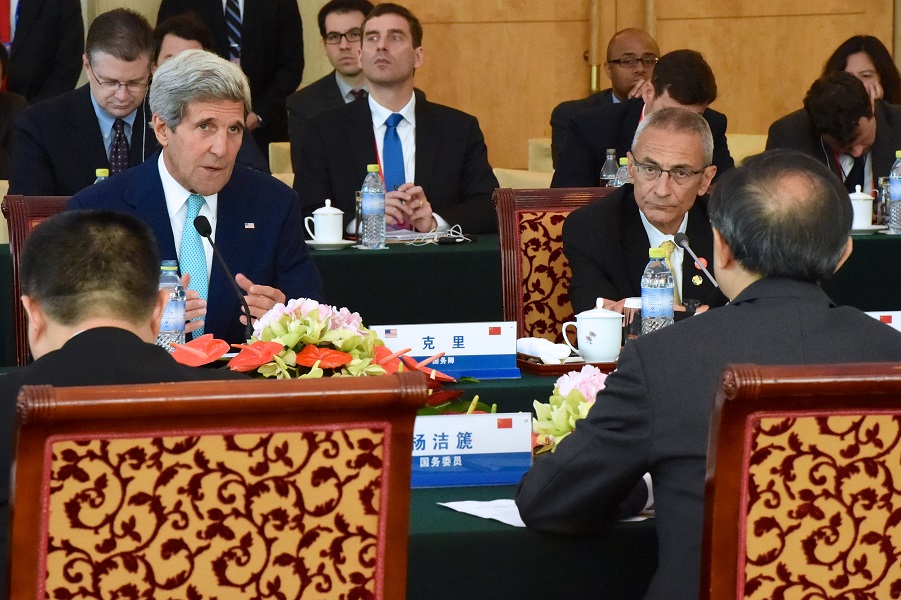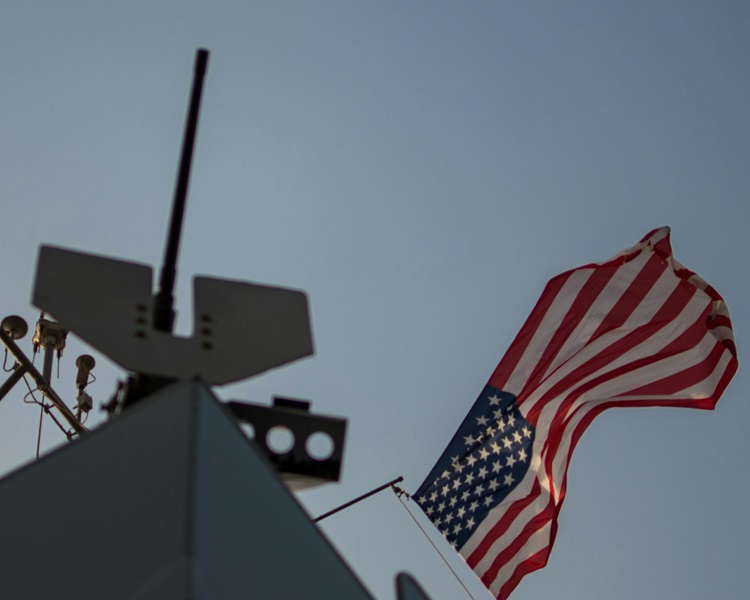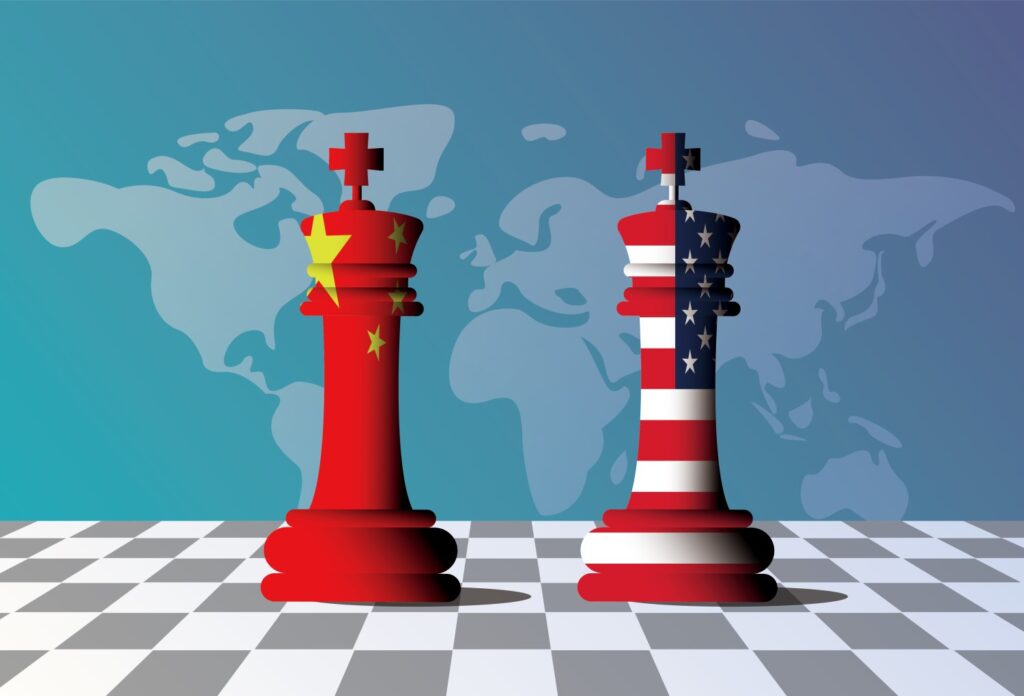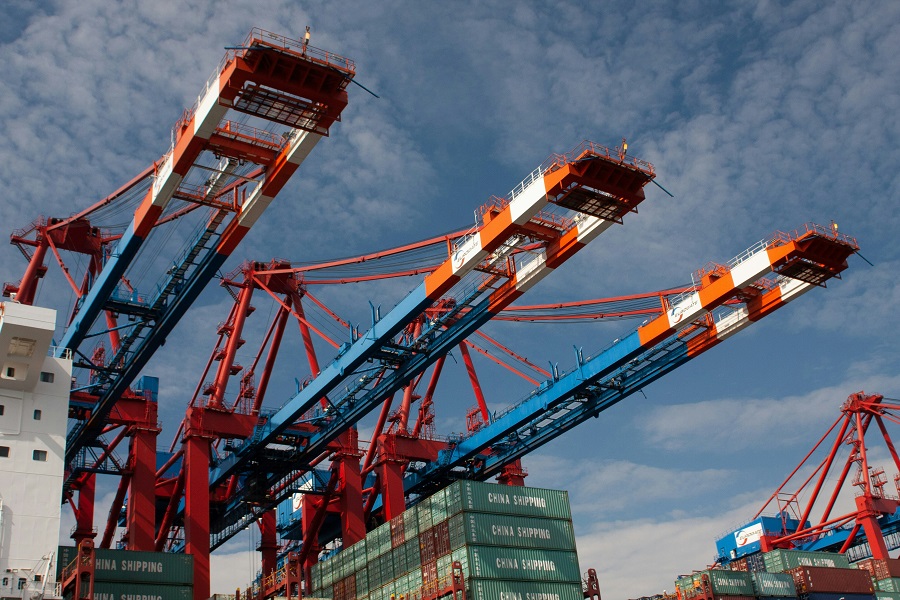
ICAS Bulletin (online ISSN 2836-3418, print ISSN 2836-340X) is published every other week throughout the year at 1919 M St NW, Suite 310, Washington, DC 20036.
The online version of ICAS Bulletin can be found at chinaus-icas.org/bulletins/.

– BIO, the world’s largest trade group for the biotechnology industry, supports U.S. legislation severing ties with Chinese healthcare firms, leading to WuXi AppTec, a key player in the pharmaceutical supply chain, withdrawing from BIO.
– On March 14, the new chief U.S. climate negotiator John Podesta argued that China should make a faster transition away from coal given the country’s status as the largest emitter of greenhouse gasses.
– The U.S. House China committee urged the Biden administration to impose higher tariffs on Chinese drones, citing national and economic security threats.
– On March 21, Georgia House of Representatives passed SB420, a bill prohibiting “agents” of China from purchasing farmland or land near military installations, with a 97:67 vote.
– Chinese students traveling to the United States are increasingly encountering difficulties at U.S. border control, including lengthy interrogations and visa cancellations, leading to growing skepticism about studying abroad in the U.S. among Chinese families.
– Brad Setser and other U.S. economists are openly cautioning that the ramped-up mass production of various products, including cars, appliances, computer chips, and electronics, by Chinese factories in global markets may trigger new trade tensions with the United States and Europe.
Associated News References:
“Biotech Trade Group Will Support a US Bill Limiting China Ties” Bloomberg, March 14 [Paywall]
“New US climate envoy wants China to speed up coal transition” France 24, March 14
“US lawmakers ask Biden administration to increase tariffs on Chinese-made drones” Reuters, March 20
“Land purchases by Chinese ‘agents’ would be limited under Georgia bill; Democrats say it’s racist” AP, March 21
“Chinese students, academics say they’re facing extra scrutiny entering U.S.” The Washington Post, March 14 [Paywall]
“Flood of Chinese imports could renew trade tensions, threaten U.S. jobs” The Washington Post, March 18 [Paywall]

– China’s Ministry of Industry and Information Technology asked EV carmakers ranging from BYD Co. to Geely Automobile Holdings Ltd. to significantly increase their purchases from local auto chipmakers to reduce reliance on Western imports and boost China’s domestic semiconductor industry.
– On March 15, Apple agreed to settle a class-action lawsuit for $490 million after Apple shareholders alleged that CEO Tim Cook defrauded shareholders by concealing falling iPhone demand in China.
– The owner and officials of New York-based tech company Aventura Technologies Inc. were found guilty of a scheme from 2006 to 2019, falsely labeling Chinese-made security equipment as “Made in the USA.”
– Apple has been reportedly holding preliminary discussions with Baidu regarding the potential use of the Chinese company’s generative artificial intelligence (AI) technology in Apple devices in China.
– At the China Development Forum on March 24, Apple CEO Tim Cook emphasized the importance of artificial intelligence in helping businesses reduce their carbon footprint and highlighted Apple’s commitment to environmental sustainability.
– China Evergrande Group has decided to abandon its efforts to restructure billions of dollars in offshore debt in the United States, following a Hong Kong court’s order for the heavily indebted developer to liquidate.
Associated News References:
“China Urges EV Makers to Buy Local Chips as US Clash Deepens” Bloomberg, March 15 [Paywall]
“Apple reaches $490 million settlement over CEO Cook’s China sales comments” Reuters, March 15
“New York tech company admits selling Chinese security products as American-made” The Washington Times, March 20
“Apple Held Talks With China’s Baidu Over AI for Its Devices” The Wall Street Journal, March 22 [Paywall]
“Apple’s Cook Tells China Forum AI Is Key for Climate Battle” Bloomberg, March 24 [Paywall]
“China Evergrande Drops Debt Restructuring Applications in U.S.” MSN, March 25

– Chinese students are increasingly opting against studying in the United States, with concerns about safety and rising costs being cited as key factors.
– On March 18, a People’s Liberation Army social media account accused the United States of threatening global security after a report that SpaceX’s Starshield unit is developing the satellite network under a classified $1.8 billion contract with the National Reconnaissance Office.
– U.S. Secretary of State Antony Blinken praised the strengthening of U.S.-Philippines defense ties during a visit to Manila and emphasized that the U.S. was engaged in intense diplomacy to reaffirm international law.
– China foreign ministry spokesman Lin Jian stated that the U.S. had “no right” to intervene in the South China Sea, following Secretary of State Antony Blinken’s assertion of U.S.-Philippines defense ties.
– China expressed strong opposition to U.S. assertions that Arunachal Pradesh belongs to India as tensions over the disputed border shared by both countries continue.
– Top U.S. admiral Admiral John Aquilino testified that China is building its military and nuclear arsenal and appears committed to the ambition of potentially invading Taiwan by 2027, highlighting the surge of China’s official defense budget by 16% despite economic challenges.
Associated News References:
“After the pandemic, young Chinese again want to study abroad, just not so much in the US” AP, March 16
“China’s military, state media slam U.S. after Reuters report on SpaceX spy satellites” Reuters, March 18
“Blinken lauds ‘extraordinary’ expansion of defense ties with the Philippines amid China tensions” NBC News, March 19
“China Says US Has ‘No Right’ To Interfere In South China Sea” Barrons, March 19
“China firmly opposes US remarks on Arunachal Pradesh, foreign ministry says” Reuters, March 21
“China on Track to Be Ready for Taiwan Invasion by 2027, US Says” Bloomberg, March 20 [Paywall]

During a trade mission to Manila, U.S. Commerce Secretary Gina Raimondo announced plans to invest over $1 billion in the Philippines’ tech sector, aiming to double semiconductor factories and reduce reliance on China.
– According to former U.S. officials, former President Donald Trump reportedly authorized a covert CIA operation in 2019 to influence Chinese public opinion against its government by spreading negative narratives online and leaking disparaging intelligence to news outlets.
– Chinese foreign ministry spokesman Lin Jian criticized U.S. ambassador Nicholas Burns for his negative comments about China and warned that the remarks of Burns risk undermining recent efforts to improve the relationship between the two nations.
– Baimadajie Angwang, a former New York City Police (NYPD) officer, is suing the NYPD for ending his employment after federal prosecutors charged him for allegedly spying for China and then dropped the charges.
– After the U.S. State Department called the new Hong Kong security law “poorly defined and incredibly vague,” the Chinese embassy in the U.S. expressed strong dissatisfaction and opposition to the comment, labeling it as “denigration and smearing.”
Associated News References:
“China Cancels Another Shipment of US Wheat,” Transport Topics, March 11
“Weight Loss Drugs Threatened by US Effort to Contain China,” Bloomberg, March 6 [Paywall]
“Wuxi Companies’ Shares Rise on Receding Worries About Potential U.S. Sanctions,” The Wall Street Journal, March 4 [Paywall]
“US funding bill blocks China from buying oil from Strategic Petroleum Reserve,” Reuters, March 3
“Boeing agrees to $51 mln settlement for US export violations, including in China,” Reuters, February 29

– On March 13, the U.S. House of Representatives passed a bill by a vote of 352:65 that could result in a U.S. ban of TikTok unless it separates from its Chinese parent company, ByteDance.
– U.S. Secretary of the Treasury Janet Yellen is scheduled to meet representatives of American businesses in Guangzhou, China to address their overcapacity and intellectual property concerns before traveling to Beijing in early April for face-to-face meetings with Chinese counterparts.
– Leaders in the emerging Western nuclear fusion industry are meeting in Washington D.C., the last week of March to address funding challenges and avoid falling behind China in the race to develop and build commercially viable reactors.
Associated News References:
“Live updates: House passes bill that could lead to US ban of TikTok” CNN, March 13
“China’s Protest of TikTok Bill ‘Supremely Ironic,’ US Envoy Says ” Bloomberg, March 14 [Paywall]
“The contrasting tales of TikTok and Nippon Steel” Financial Times, March 19 [Paywall]
“Nuclear fusion backers meet in US capital as competition with China looms” Reuters, March 20
“Exclusive | On return trip to China, Treasury head Janet Yellen to hear US firms: sources” South China Morning Post, March 25 [Paywall]

“China protests Taiwan minister’s role at Seoul summit backed by U.S.” Reuters, March 18
“US resolution on Gaza ceasefire and hostage deal vetoed by Russia and China” The Guardian, March 22
“China and Russia challenge US claim to mineral-rich stretches of seabed” Financial Times, March 25 [Paywall]
“Bad Haircut? A Hot Chinese App Is Giving Americans Blunt Advice” The Wall Street Journal, March 23 [Paywall]
“Chinese and western scientists identify ‘red lines’ on AI risks” Financial Times, March 18 [Paywall]
Wednesday, April 10, 2024
9:30am – 10:30am EST
Virtual (Zoom)
Artificial Intelligence has emerged as an unlikely area of U.S.-China cooperation amid their race for supremacy in cutting-edge technologies. In November 2023, President Biden and President Xi agreed to establish a govt-to-govt mechanism to discuss AI at their summit in Woodside, California, and a US-China working group on AI is expected to hold talks later this spring. Alongside, American AI companies have engaged in discussions with Chinese AI experts, and leading scientists of both nations have jointly put out calls for tighter controls on the technology.
As the U.S.-China working group on AI convenes later this spring, what are the set of priority areas to be discussed? Have the parameters of their discussion been established? What are the areas of common interest that are drawing the two sides together? Do the U.S. and China share a common vision of the core ‘red lines’ that powerful AI systems should not cross? Do they trust their counterpart enough to limit their own capability voluntarily? Can the U.S.-China talks, along with their discussions with the EU, serve as a building block for a multilateral treaty, say, on the lines of the 1960s-era Nuclear Non-Proliferation Treaty? Furthermore, what is the particular Chinese interest in these talks? And where does AI sit within the larger scheme of China’s technological advancement aspirations? To listen to these and other answers and insights on pressing U.S.-China AI policy questions, tune in to the event on April 10th.
Thursday, April 18, 2024
10:00am – 11:30am EST
In-Person (Washington, DC) & Online (Zoom)
As science and technology continue to advance, the ocean, covering 71% of the Earth’s surface, is undeniably assuming an increasingly vital role for humanity. Consequently, nations are diligently pursuing their respective maritime interests, revealing both commonalities and distinctions. The United States and China, widely recognized as major powers in contemporary international politics and prominent maritime nations, are increasingly focusing their attention on global maritime domains.
How do the maritime policies of China and the United States differ in terms of strategic objectives and priorities? What are the primary areas of competition between China and the United States in global maritime affairs? How do the maritime disputes, such as those in the South China Sea, impact the overall relations between China and the United States? Are there any ongoing cooperative efforts between China and the United States in global maritime security or environmental protection? What role do international law and institutions play in shaping the interactions between China and the United States in global maritime relations? How do the military doctrines and strategies of China and the United States intersect or diverge in the maritime domain?
In her new book US-China Global Maritime Relations, Dr. Nong Hong explores the U.S.-China maritime relationship within the global context and investigates six key maritime regions: the South China Sea, the Northeast Asia waters, the Indian Ocean, the South Pacific Ocean, as well as the Arctic and Antarctic regions. Through detailed observations, this book offers a comprehensive exploration of these regions and their significance in shaping the dynamics between the two nations.
This event will feature the author of US-China Global Maritime Relations, who will discuss the evolution and execution of maritime strategies pursued by both the United States and China. Moreover, three panelists will provide their insights on this subject, representing perspectives from the United States, China, and a third-party viewpoint.
On March 15, 2024, the Institute for China-America Studies (ICAS) Expert Voices Initiative (EVI) conducted an interview with Dr. Wu Shicun, Chairman of the ICAS Academic Advisory Board, to discuss the current state of the U.S.-China bilateral relationship, summarize the trending topics at the 2024 Munich Security Conference, assess the situation in the South China Sea as tensions rise between China and the Philippine, and examine the value of people-to-people exchanges following the joint vision of the San Francisco Summit between President Xi Jinping and President Joe Biden. The interview was hosted virtually via Zoom by Research Associate Yilun Zhang.
The interview began with an overview of the current state of the U.S.-China bilateral relationship and how the election result in Taiwan and the upcoming 2024 U.S. elections may impact the bilateral relationship in the near term. Among other topics, Dr. Wu Shicun also provided a comprehensive review of his in-person experience at the 2024 Munich Security Conference where Chinese Foreign Minister Wang Yi delivered a speech outlining China’s vision to the western countries. Following a lengthy discussion on South China Sea perspectives, Dr. Wu Shicun stressed the critical value of people-to-people exchanges, especially Track-II dialogues, during a time when domestic politics is trumping foreign policymaking. The discussion concluded on a positive note that the two countries should correct their misunderstanding about each other and embrace positive views that allow coexistence.
By Yilun Zhang
March 19, 2024
Just a little more than a year since the notorious “Chinese balloon incident,” a congressional probe of Chinese-built cargo cranes revealed the shocking finding last week that there was communications equipment emplaced within the cranes that did not appear to support normal operations. The Chinese company that produced the cranes, the Shanghai Zhenhua Heavy Industries (ZPMC), denied the findings and called the probe “misleading.”
This article was originally published on The Carter Center’s U.S.-China Perception Monitor on March 19, 2024
By Nong Hong
March 17, 2024
Over the last two years, there has been a big shift in Arctic geopolitics. After the Ukraine war broke out, Sweden and Finland departed from their long-standing military non-alignment policy and applied to join Nato. Sweden officially became a member of the transatlantic security alliance this month, while Finland joined last April. With Nato extending its northern reach, Russia has been keeping a close eye on the Nordic Response, military drills between Finland, Norway and Sweden that represent the Arctic arm of the Nato-wide Steadfast Defender military exercise this year, its largest ever…
This commentary was originally released by South China Morning Post on March 17, 2024
Event Summary: Taking On the China Challenge with Congressman Kevin Hern, Hudson Institute
by Amanda Jin
March 14, 2024
On March 8, 2024, the Hudson Institute held an event where U.S. Rep. Kevin Hern (OK-1) and Hudson’s Senior Fellow Rebeccah Heinrichs had a conversation about “how Congress can restore America’s advantage over the People’s Republic of China in the new cold war.” The event was titled “Taking On the China Challenge with Congressman Kevin Hern.” The event occurred shortly after Rep. Hern introduced the Counter Communist China Act and after the House Committee on Energy and Commerce advanced a bill to require ByteDance to divest interests and influence from TikTok. Rep. Hern was also a co-sponsor of the TikTok bill.
During the event, Rep. Hern and Ms. Heinrichs primarily discussed their concerns for China and ongoing congressional actions to address these concerns—most notably through the TikTok bill and the Counter Communist China Act…
On Monday, March 18, 2024, Senior Fellow Sourabh Gupta was quoted by China Daily on TikTok and its future fate in Congress and the courts.
On Monday, March 18, 2024, Senior Fellow Sourabh Gupta was quoted by People’s Daily on the Global Civilization Initiative. [In Chinese]
On Thursday, March 14, 2024, Distinguished Fellow Denis Simon was quoted by The Wall Street Journal on the U.S.-China Science & Technology agreement extension.
On Wednesday, March 13, 2024, Research Associate & Administrative Officer Yilun Zhang was quoted in South China Morning Post on the delay in China-Japan-ROK trilateral dialogue.

The Institute for China-America Studies is an independent nonprofit, nonpartisan research organization dedicated to strengthening the understanding of U.S.-China relations through expert analysis and practical policy solutions.
1919 M St. NW Suite 310,
Washington, DC 20036
icas@chinaus-icas.org
(202) 968-0595
© 2024 INSTITUTE FOR CHINA-AMERICA STUDIES. ALL RIGHTS RESERVED.